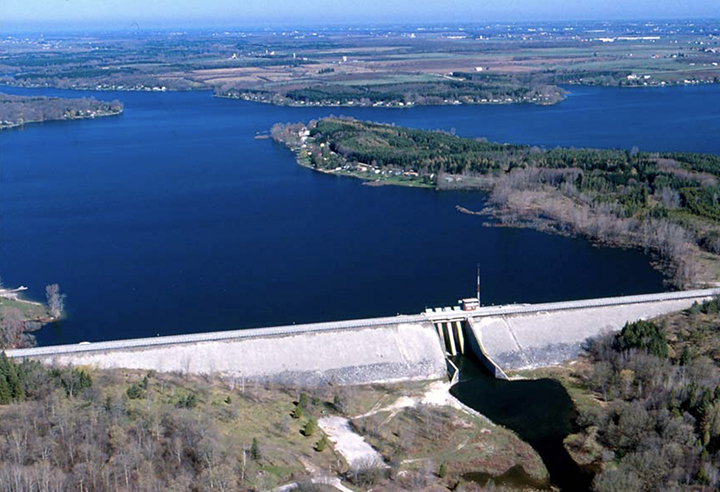The Grand River Conservation Authority (GRCA) will spend almost $36 million this year on programs.
The conservation authority’s programs protect life and minimize property damage from flooding and erosion, improve the health of the Grand River watershed, connect people to the environment through outdoor experiences and manage its land holdings in a responsible and sustainable way, officials say.
The budget was approved by the GRCA board on Feb. 28.
The board is made up of 26 members appointed by the municipalities in the Grand River watershed.
Municipalities will contribute about $11.9 million in general municipal levy to the GRCA in 2020; about 33 per cent of the GRCA’s total budget.
The municipal levy portion is increasing by 2.5%, which works out to an average of approximately $10.97 per watershed resident; an increase of 13 cents per watershed resident in comparison to the 2019 budget.
The municipal levy portion of the budget is allocated to each member municipality using the “Modified Current Value Assessment” as outlined under Regulation 670/00 of the Conservation Authorities Act.
Other federal, provincial and municipal government grants totalling just over $4 million represent 12% of the budget.
This includes funding for major maintenance of water control structures, the source projection program, floodplain mapping projects and rural water quality landowner grants.
The GRCA generates more than $16 million or 45% of its own revenue through sources such as camping fees, park admissions, nature centre programs, hydro sales, property rentals, tree sales, planning permits and donations raised by the Grand River Conservation Foundation (GRCF).
Finally, 10% of the total budget in 2020 will come from GRCA reserves.
In 2020, a number of significant capital projects are planned, along with special projects related to floodplain mapping and the Emerald Ash Borer (EAB) infestation, for which reserves will be accessed for funding.
The water control structure and park reserves represent amounts that were set aside in prior years to help fund future capital spending needs. The floodplain mapping and EAB special projects are accessing reserves that are subject to provincial approval.
2020 Budget highlights
In 2019, the Ontario government reduced its Section 39 funding for the GRCA’s flood management program by $420,000.
In order to offset this reduction, the GRCA has identified a number of strategies so as to continue to deliver programs that are currently in place and balance the 2020 budget.
These strategies include the use of reserves, the realization of additional revenue and a decrease in expenses where possible.
The provincial government is in the process of making changes to legislation through Bill 108, the More Homes, More Choice Act.
The changes are expected to result in new regulations for conservation authorities, and have yet to be established.
Once the new regulations are introduced, the GRCA will incorporate any necessary changes to future budgets and/or programs.
Some specific highlights of the 2020 budget include:
– Water control structures: Water control capital projects planned for 2020 include repairs on a number of the GRCA’s smaller dams, as well as an ice jam mitigation feasibility study through the Brantford dike reach, Conestogo Dam still basin concrete repairs and the next phase of the Conestogo Dam gate refurbishment and seal replacement, preparation work for gate refurbishment at Shand Dam, the design and environmental assessment for seepage, stability and capacity improvements of the Bridgeport dike in Kitchener, and the east bank upstream wall repair and design of the block wall and pump room outlet of the Cambridge dike.
– Drinking Water Source Protection Plan: The GRCA continues to work on the updates and implementation of a Drinking Water Source Protection Plan for each of the four watersheds in the Lake Erie Source Protection Region, including the Grand River watershed, as part of the provincial Source Protection Program under the Clean Water Act, 2006.
Besides supporting municipalities and other agencies in implementing the plans, the focus in 2020 continues to be the completion of updates to the Grand River Source Protection Plan, including development of water quantity policies, updating water quality vulnerability assessments, and the development of the annual progress report for the Grand River Source Protection Plan.
– GRCA conservation areas: The GRCA manages one of the largest networks of conservation areas in the province.
The 11 fee-for-use conservation areas and the Luther Marsh Wildlife Management Area provide a wide range of recreational opportunities. Admission, camping and other fees cover operating costs and capital project costs.
Expenditures planned for 2020 include regular maintenance, as well as spending on major repairs and new construction.
Major capital projects within the GRCA’s conservation areas will include: completion of the Upper Pines seasonal campground and expansion of the north side gate house at Elora Gorge, perimeter fencing at Elora Quarry, playground replacements and a new workshop at Brant, and playground replacements at Laurel Creek.
– Hazard tree management: In April 2018, the GRCA received approval from the Ministry of Natural Resources and Forestry to use up to $1.8 million from its land sale reserve fund for hazard tree management over a three year period.
This funding has allowed the GRCA to accelerate its program of tree risk management to ensure the health and safety of the public using GRCA lands. This program will continue through 2020 and 2021.



